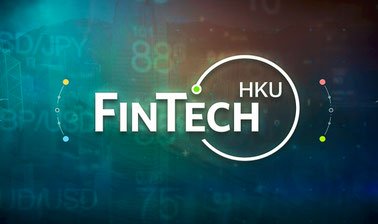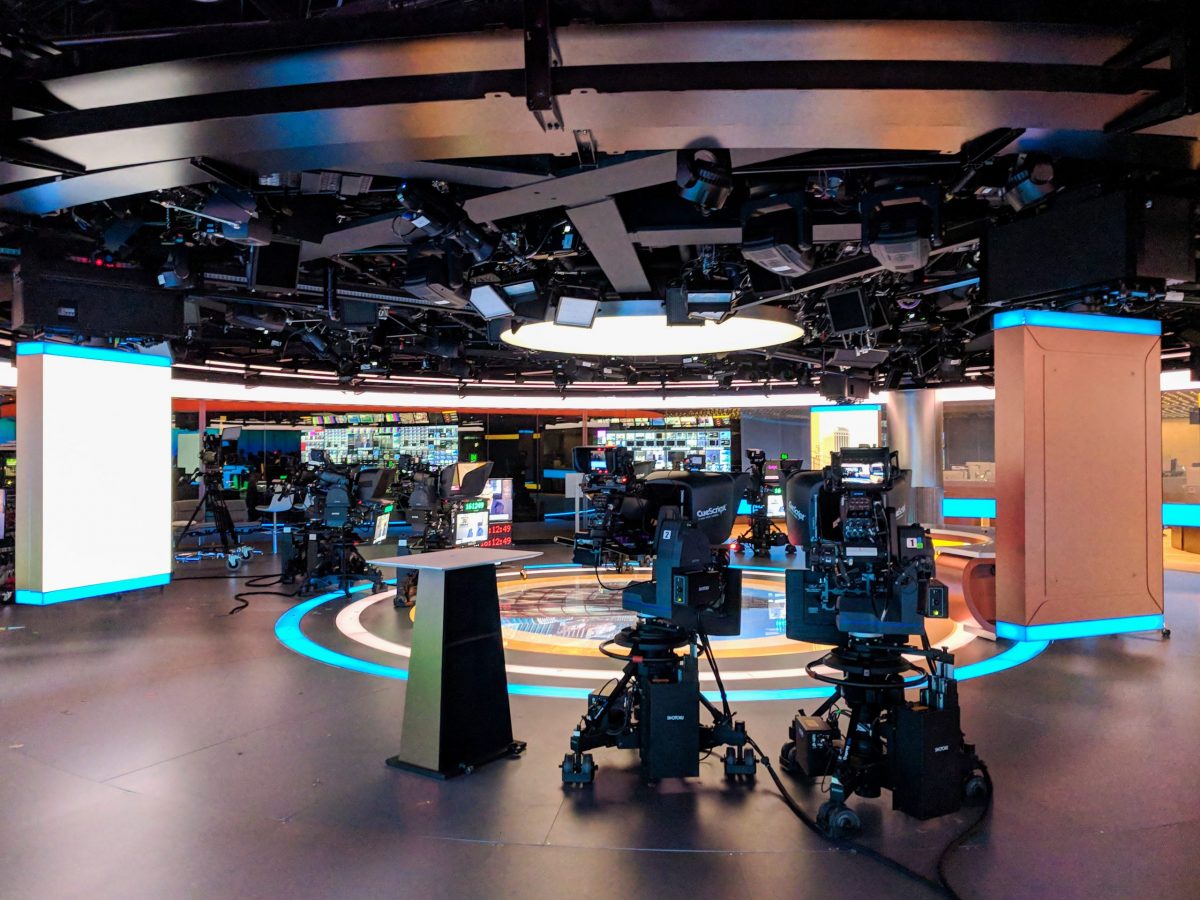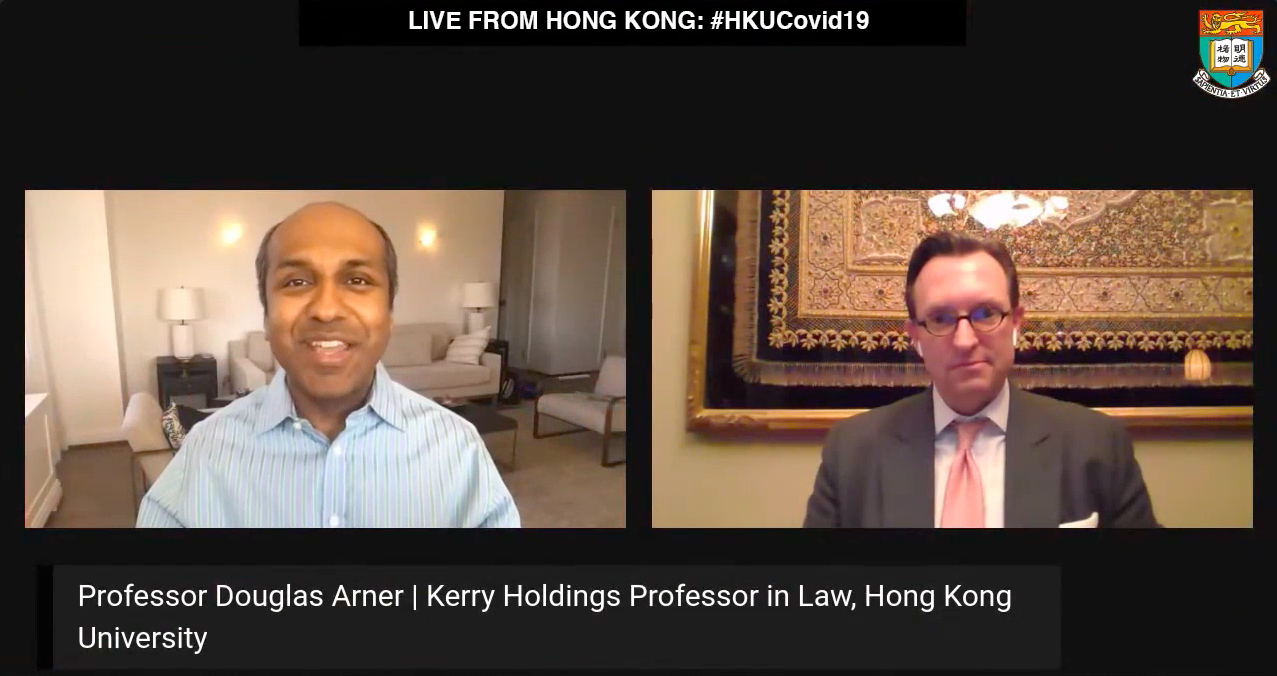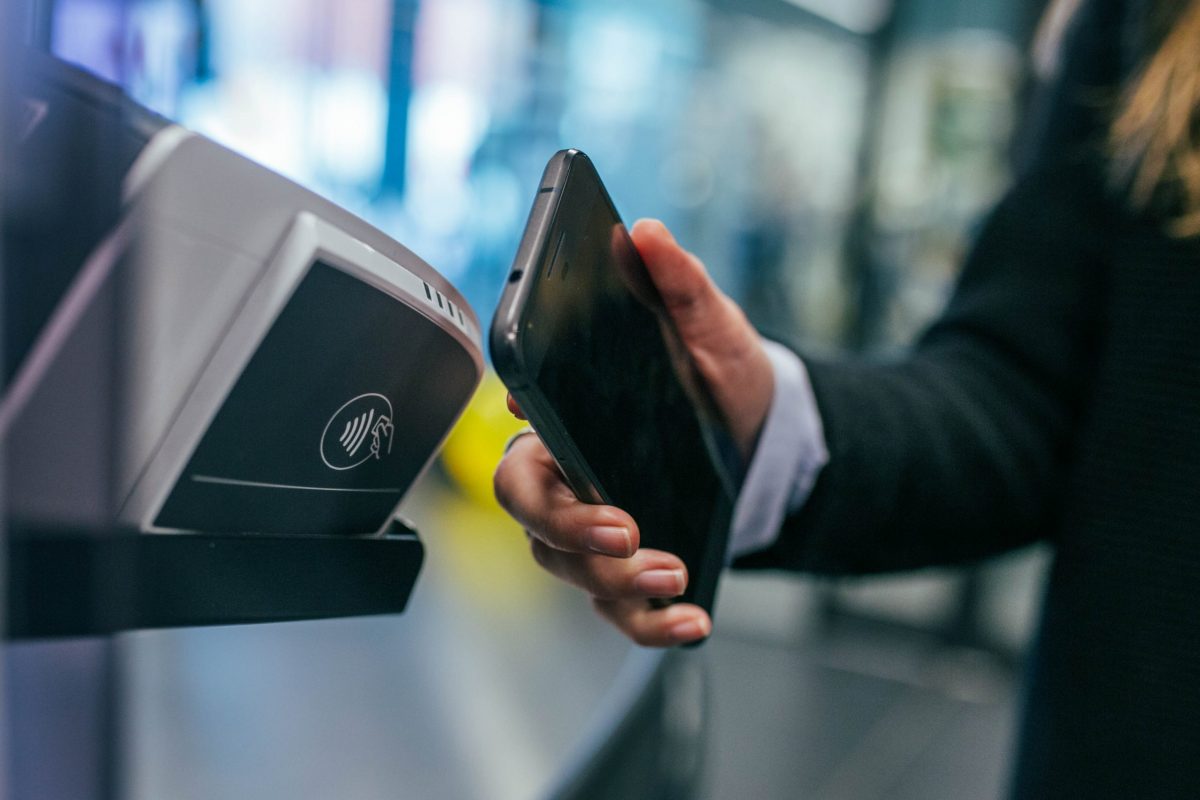Prof Douglas Arner on FinTech Transformation

On May 21, 2020, fightcovid19.hku.hk conducted a live conversation with Professor Douglas Arner, Kerry Holdings Professor in Law and Associate Director of the HKU-Standard Chartered Foundation FinTech Academy at The University of Hong Kong on Covid-19 and the FinTech Transformation.
Note: In this transcript of their dialogue, Professor Sri Sreenivasan is informally identified as Sree and Professor Douglas Arner is Douglas; the transcript has been edited for readability and length.
Hello everyone. My name is Sri Sreenivasan. I’m the Marshall Loeb Visiting Professor of Digital Innovation and Audience Engagement at Stony Brook University School of Journalism.
Our guest tonight is Professor Douglas Arner, Kerry Holdings Professor in Law, and director of the Asian Institute of International Financial Law at HKU. He also serves as director of the world’s largest MOOC, or Massive Open Online Course, “Introduction to FinTech.” The course, launched on edX.org in May 2018, has attracted more than 65,000 learners worldwide.

His research interests include the intersection of innovation, technology and entrepreneurship. He is the author, co-author or editor of 18 books, and the author or co-author of more than 150 articles, chapters and reports that have been downloaded more than 100,000 times, making him one of the top 100 authors on the Social Science Research Network. He holds a BA from Drury College, a JD from Southern Methodist University and an LLM and PhD from the University of London. And he’s the author of “The REGTECH Book,” a financial handbook for entrepreneurs, investors and regulators. We’ll get a chance to talk to him about all of those topics. So please welcome our guest today. Hello, professor.
Sree: As you know, we’re in the epicenter of the pandemic here in New York. When this started, we would look at places in Asia, like China, or places in Europe, like Italy, and think they’re in really bad shape. But then suddenly it transitioned and we’re in the heart of the storm. This is an unusual position for America. We are seeing the impact of leadership, the impact of technology, the impact of the global world we’re now in, and it’s something that we all have to adjust to, don’t we?
Douglas: That’s very much the case. Today was apparently the highest single day of confirmed cases so far, not in the United States, but globally. We’ve just crossed five million, and we’re moving from a situation where the virus has crossed the major economies, and is now moving increasingly into the developing world. If we think about the challenges it has raised in the developed world, the scope for far worse outcomes in developing countries is even more clear.
Sree: That is something that we are so concerned about — the impacts on the economic side as well as the health side. How do you break down the importance of balancing that with all the other concerns?
Douglas: I’ve spent the past 25 years working in financial crises. If I compare 2008 to today, the key difference is that 2008 was a financial crisis. The epicenter was in the financial system. It was problems in the financial system that in turn caused problems in the real economy in the United States, and all over the world. This is primarily a health crisis, but it is having a direct impact on economies, and via the economy, the financial system. As we think about how we deal with this crisis, one of the most important elements in trying to build a response is the financial system, basically making sure that our financial infrastructure doesn’t collapse, and secondly, trying to get money to the people in countries all over the world who need it.
Sree: We have a global audience here, so let’s see who’s watching with us. Nandini is watching from Toronto. Kobayashi is watching from Yokohama. Alessandra is watching from Italy. We also want to give you a starter question that’s very simple: we tend to use the term “FinTech” without knowing exactly what it means. Can you tell us what FinTech is and give us some examples, some old, some new, and some things we may not realize are FinTech.
DEFINING FinTech
Douglas: People define FinTech in different ways. The way I look at it, it is the use of technology, particularly information technology in the financial sector. If we look at the past 30 years, the world has undergone a digital financial transformation so that by the time of this crisis, the beginning of the 2020s, across much of the world, we’re living in a digital financial system. If we think about that process, we can see it from four different directions that have had a very important impact in the context of how finance and digital finance have been involved in this crisis.
The first is a long-term digital transformation of developed markets. We can think of things like stock trading, high-frequency trading, the fact that in the United States and Europe and most developed markets, well over 60,70,80 percent of all stock trading and all securities trading takes place between computers, with humans only involved at the tertiary level.
Secondly, think about foreign exchange transactions, moving money across the world. This is digital movement of money, very little cash. What people think about, when they’re thinking about FinTech, are FinTech startups, new firms that challenge the traditional financial services sector. One thing that we’ve seen an explosion of since the 2008 crisis is these sorts of new entrants, such as Lending Club. The reality is, these sorts of firms are not necessarily new; think about PayPal in the 1990s; it was a FinTech startup. Today PayPal is a payments major. Likewise, think about Bloomberg. Bloomberg is in many ways the prototypical FinTech startup. Michael Bloomberg started out in IT at Salomon Brothers. What did he come up with? He came up with a secure electronic communication system. He took that out as a startup with investment from Salomon Brothers. It is today the world’s most important information services firm. That is FinTech. These are startups.

The third direction is really around developing countries. China over the past 10 years has experienced the most rapid and complete digital financial transformation of any country in the history of the world. That brings us to our fourth direction, one that is very much getting reinforced in the context of this current crisis. That is an increasing involvement, not of FinTech startups and little challengers, but rather, of Big Techs, big firms which enter into financial services and are changing the way that financial services are done — firms like Amazon in the United States, or Alibaba in China. When we think about FinTech, we’re thinking about technology and the transformative impact that it has on the way that finance is done.
Sree: I presume that’s also one of the ways you introduced FinTech in your open online course. Can you give us a sense of how COVID-19 has impacted FinTech?
COVID-19 AND THE MARKETS
Douglas: What is really important to think of in the context of finance and the COVID-19 crisis is this idea that this is not a financial crisis. It didn’t start as a financial crisis, but finance played a very important role from the start. If we look at the turmoil in stock markets, the turmoil in bond markets, one of the starting points is to make sure that markets keep functioning. Despite all the volatility, markets have kept functioning well. That is a sign that a lot of effort has gone into regulating financial services in the wake of 9/11 (terrorist attack) in the United States and in the wake of the 2008 (Great Recession).
When we think about dealing with aspects of the current health crisis, finance and particularly digital finance are at the center. If we think of major economies around the world, if we think of China’s experience, Europe’s experience, the US experience, with lockdowns and with restrictions on movement — central to people’s lives in those situations have been ecommerce, online payment systems, electronic payment systems, things like entertainment and communication services. All of these things have allowed the developed countries to go into these extended lockdown periods.
Digital finance has been a major area of growth throughout this crisis. As we go forward, this is going to be one of the bigger challenges coming out of this crisis, balancing some of the necessities of the role of Big Tech and digital finance with potential concerns about the role of those firms and in particular, the data that comes out of this crisis.
SUSTAINABILITY CRISES
Sree: To an outsider not paying attention, they hear the word “FinTech” and say, “Oh, that’s a very kind of a niche topic.”
Douglas: One of the biggest impacts coming out of the 2008 crisis was this growth of FinTech. If we think of 2007, just before the (Great Recession) crisis, we had two big technological developments. One was, of course, the iPhone. That iPhone literally placed a supercomputer in the pockets of a vast number of people all over the world. That is one transformation. The second in 2007 was the launch of a mobile payment service in Kenya called Mpesa. I think that combination, this idea of technology, the ability to use technology to make finance work in a better way, has been one of the most exciting things over the past decade.
Technology today is very different. Technology is not something little around the edges. It’s not about the consumer experience, it’s about fundamentally doing things in a different way. The best example of this has come out of the announcement just over a year ago, by Facebook, of its Libra cryptocurrency project — the idea that technology can fundamentally rewrite the way the global financial system works. That is technology from a very, very different angle.
The current crisis is one of sustainability. We are going to see more sustainability crises going forward. Not necessarily pandemics, but certainly situations which pose challenges to the ways our societies, our economy, our civilizations run themselves. It’s very important to think, and to learn from this current experience, how we can build better infrastructure.
Your last point is one of our biggest challenges over the 2020s. In some ways, it’s surprising that in the wake of the 2008 crisis that there wasn’t more pressure around globalization. Now, we’ve had Brexit, we’ve had the election of Donald Trump, we’ve had the US-China trade war. All of these happened before the pandemic. Coming out of COVID-19, one of the biggest questions is whether we are going to be able to return to this globalized world that we see in the context of tonight’s discussion. Whether people like me or like the viewers on this program will be able to fly around the world in the same way that we’ve done, whether those connections, those cross-boundary interactions, will continue in the same way as before.
FRAMEWORKS: 1919 OR 1929?
Sree: Let’s go to some of the questions coming in: In the drive for economic recovery post-COVID, how do we ensure FinTechs act responsibly?
Douglas: Two things really important are embedded in that question. The first is this idea of we’re beginning, certainly across Asia Pacific, and beginning in the context of Europe, to look forward to what comes after this crisis. That’s one part. As we look at digital finance, there’s a very important role there. The second is a bigger question around the role that in particular digital, big tech and data are going to have in our societies going forward.
I want to take that first part first. Things change as you begin to come out of this crisis. Our biggest question right now is, is it going to have a short-term impact, where people get back to normal as quickly as possible? Around Asia, what I’m seeing is people want to get back to norms as quickly as possible, but the reality of the economic impact in the rest of the world means that’s highly unlikely to happen. So the framework that we’re using to think of this is, is it 1919? Or is it 1929? In the case of 1919, it is the idea that you’re coming out of the First World War, you’re coming out of the Spanish flu, and everyone wants to get back to normal as quickly as possible. 1929, however, is the beginning of a long term period of structural change. When we think about finance, the key question right now is, is this going to be a quick recovery? Or are we looking at longer-term structural changes? I think the longer the pandemic goes on, the more likely we see structural changes. We move from questions of liquidity to questions of solvency.
Think of something like airlines. If this goes quickly, everyone’s back on planes, we have a vaccine, we have tracking, tracing, it all works. But that’s looking increasingly unlikely. As a result, if we’re looking at structural change in the context of travel and airlines, maybe those airlines are going to change the way they do business. The loans that they’ve taken out are not going to be repaid. The investors who put in money aren’t going to get their money back.
As we turn from looking at short-term responses to longer-term development, the key is thinking about how we can use digital finance to better direct the money to help the economy grow. When we look at that, much of that is around making systems less expensive to allow commercial opportunities that previously didn’t exist. What sort of infrastructure are we talking about? We’re talking about like online payment systems, we’re talking about things increasingly like central bank digital currencies.
This takes us to the answer to the second part of that question. One fundamental importance to society going forward is how are we going to deal with one product of digitization? And that is an increasing concentration of economic and other power in the hands of a small number of companies, and how we balance the benefits that come with those with the potential for slowing things down for dominance or inequality? After all, we’re talking about network effects. One aspect of network effects is winner-takes-all, and winner-takes-all means that someone has everything and everyone else has nothing and from the standpoint of inequality, that is a fundamental problem. In the context of dealing with the pandemic, the necessity of relying on big tech is bringing to the fore real challenges around the role that we want data and concentrations of data to have in societies around the world.
SEEKING FINANCIAL INCLUSION
Sree: Here’s a question from Helen Welby of the Alliance for Financial Inclusion. How can we ensure that we are leveraging FinTech to overcome COVID-19 and working to include women in the process?
Douglas: This is a really important question. It highlights something that we see with every financial or economic crisis. The impact of economic and financial crises invariably rest more heavily on disadvantaged groups. We’re already seeing increasing statistics around the world where the impact of the crisis in terms of job losses or other impact is falling much more heavily on women than on men. This is already reinforcing pre-crisis trends where wage differentials in most societies around the world between men and women were already substantial.

My biggest concern, as we move into the next phase of this crisis, is in the context of developing countries, which don’t necessarily have the financial resources as major economies like those of the United States or Europe or China. As we look at the impact in these crises, some of the research that is coming out of the World Health Organization, the United Nations Development Programme, and others, it is basically saying that we are losing decades of development impact, potentially in some cases as a result of this crisis. And we are still at very early stages. Going forward, a project that my team has worked very heavily on is how can we use digital finance to support both financial inclusion — financial inclusion from the standpoint of not only how do we get people bank accounts or how do we bring them into the financial system, but how can we improve their lives? How can we use finance through financial inclusion to support longer-term sustainable development? What we’re finding is that the best combination of tools is a combination of really four different things.
The first is a digital identity system where individuals have formal forms of identification that make it relatively straightforward for them to open banking and financial accounts. Being able to open banking and financial accounts, combined with electronic payment systems, provides the basis for much more effective use of finance by governments, by societies, by businesses. Think about something very simple that we often take for granted. In developed countries, the ability to pay salaries into a bank account, from the standpoint of someone who is receiving a salary in electronic form into their bank account, that is much safer. The transaction costs also are much lower, and what we call leakage, essentially fraud, corruption, etc, also is much lower.
When we think about using digital finance, in the context of addressing some of the sustainability issues around this crisis, we really have to think about investing in this infrastructure. What we’re seeing is that this sort of infrastructure increases not only financial inclusion, but has a beneficial impact across global sustainable development goals, including helping to bring women into the formal financial system, which helps in the context of better getting them through the crisis.
Sree: Let’s do a global tour again. We have Shreyans watching from New Delhi. Carlsberg is watching from the Philippines. Daniel is watching from Oxford. We have Diego watching from Portugal. This is incredible. Just to remind everyone ,I’m sitting in New York, the professor’s at HKU. A thought on this as you absorb all of this professor?
Douglas: I wonder how long it’ll be before we can all get back on airplanes and fly to these various places.
Sree: Waleed is watching from Kuwait. This all reminds me that even in the middle of a pandemic, we are able to do this. We’re very grateful to the systems that make this possible.
DIGITAL INFRASTRUCTURE AND TECH RISK
Douglas: That highlights the impact of t digital infrastructure. It’s been interesting in this crisis, that one aspect of digital infrastructure, whether financial or other, is not only our reliance on it, but also the risks it raises. We call this tech risk. The idea that, if you’re fundamentally relying on digital infrastructure, that brings with it risks. What we’ve seen is not just the growth of digital. What is the fastest area of growth in crime today? It’s digital crime. Likewise, where have we seen an explosion not just in digital crime, but in cybersecurity issues, hacking, state to state terrorist activities, national competition, all in the context of this digital environment?
The financial sector is very much at the heart of this. Why? The old saying, “Why do you rob banks? Well, it’s because that’s where the money is.” It’s always been that way. And today, why rob one bank, if you can rob all of the accounts from a single bank at one time. But of course, what we also saw in 2008 is that if the banking sector collapses, that causes serious economic problems. From a national security standpoint, the financial system is some of the most essential infrastructure. It’s interesting that in a number of places where we think about essential workers, they have in many cases been financial sector workers, because at the end of the day, you need the payments to flow. You need the stock markets to trade, you need the bond markets to work so that governments can raise money, so that they in turn can direct people and health systems to fight the crisis and rebuild afterwards.
HONG KONG RECOVERY AND CASH
Sree: We have a question from Mini in Beijing. How will FinTech contribute to the recovery of the Hong Kong economy after COVID-19?
Douglas: This is a very interesting question because if we look at Hong Kong, Hong Kong has emerged over the past two decades as probably the world’s third most important international financial center. Much of that role has been as an intermediary between China and the rest of the world. Not surprisingly, when you have a major financial center, you also have a major concentration of tech, but FinTech in Hong Kong has been very different from FinTech in mainland China, and likewise FinTech in Hong Kong has been very different from outside. FinTech in Hong Kong has been very wholesale-focused. As we go forward, probably the bigger role for Hong Kong is going to be as a conduit for many of the large mainland internet firms and financial services firms to engage with the rest of the world. I think from the standpoint of Hong Kong, FinTech is really at the core of its future as a financial center. One of the biggest challenges for Hong Kong as a center is the reopening process. How do we allow people to come in and out? That’s one of our biggest problems going forward.
Sree: Let’s go to Ruth Plato-Shinar, Professor of Banking Law and Financial Regulation in Israel, who asks: With FinTech, how do you see the future of cash, especially in developed economies versus developing economies?.
Douglas: It’s a very good question. There were lots of discussions about cashless societies prior to this crisis. We’ve had a real acceleration of that, the necessity of getting money to people through digital means. But, second, because people in many places have had an increasing fear about actually handling cash from a health standpoint (there’s certain research that actually brings issues about that), we’re seeing both a consumer demand as well as a sort of structural demand towards greater use of digital. We’ve seen it in a number of countries– Sweden as an example, China is another — where use of cash in many places is very much the exception. Also what we see in many developed markets, like the US or the UK, is that cash is very important from a financial inclusion standpoint. In other words, amongst the poorest and most disadvantaged people that often don’t have bank accounts or digital access, they are fully dependent on cash. So if you eliminate cash, you’re actually further disadvantaged in a disadvantaged group.

Now what we’re seeing are some of the most interesting discussions about the future of money and the role of technology that have ever taken place. We think about discussions around central bank digital currencies, the idea of governments being able to create digital forms of money, which they can then use to replace cash. China is in pilot-testing of its digital currency electronic payment system. We’re seeing a pickup in discussions in the United States about the creation of a digital dollar. Likewise, just yesterday, Societe Generale, one of the world’s largest banks, ran a transaction where it raised bonds in a blockchain environment which were settled in digital euro central bank digital currencies. When we think about the future of cash, the key is not just the future of cash, it’s about the future of money, and of governments in that money.
MOOC, PayPal and ATM
Sree: Can you reflect on “Introduction to FinTech,” your MOOC, or Massive Open Online Course, for a minute. Why such a big interest in this topic??
Douglas: First, a big shout-out to everyone from the course who’s joined us tonight. When we came up with the idea and it was a group of us who came up with the idea, the idea was to try to make FinTech understandable to people all over the world. Why? Because what we saw with the 2008 financial crisis is regardless of whether you understand finance, finance impacts you from the standpoint of transforming our economies, our financial systems, our societies. So we set out to build a course open to everybody. The response to that has been absolutely amazing. I guess it’s not really surprising that in the context of the lockdowns around the world, we’ve seen even increasing interest, with 1,000 or more people joining every week.
If you’re interested in it, it’s free. Just check out the edX.org website, the online learning platform founded by Harvard and MIT, and including leading universities all over the world. It’s something that we’ve been really proud of — the impact, seeing people really react to what we’ve done.
Sree: In 2000, I wrote an article about a brand new thing, and I said, “I have seen the future of cash.” I haven’t been able to print my own, but this will do for now. This was about my first encounter with PayPal 20 years ago, July 2000. So my question to you is, when you see all these things being born. how do you know when something is real, something will have legs versus something that’s just kind of vaporware or trend of the moment?
Douglas: That’s a really interesting question. It’s particularly important, because in the aftermath of the 2008 crisis, Paul Volcker, former chairman of the US Federal Reserve, made a famous statement. He said that in his career, the only important innovation which he had seen in the financial sector was the ATM. Basically, what Volcker was saying is that things like (over-the-counter and derivative markets), and complex financial products, these things really didn’t make the world a better place. What made the world a better place was things like the ATM machine that actually fundamentally impacted people’s lives. What has been really exciting, the same way that PayPal was exciting, about the explosion of FinTech startups over the past 10 years, is that so many of them were about people trying to figure out better ways to use technology to make the financial system work. When I’m looking at something new, I’m looking, is this just sort of a regulatory arbitrage? In other words, are you just trying to get around some existing rules? Is this just redoing something in a different way? Or is it fundamentally about making finance work better for real people in the real economy?
Sree: We’re almost out of time, so I’m going to wrap a couple questions together. There’s great potential for FinTech in Africa, but lack of digital infrastructure is slowing FinTech startups. Also, how can developing countries cue into FinTech at this point, considering problems of financial inclusion due to illiteracy?
LOWERING THE DIGITAL DIVIDE
Douglas: The digital infrastructure divide is one thing we think about in societies. But we also need to think of it from the standpoint of countries. You can have a country that doesn’t have a lot of resources, but if they think carefully, they’re able to use those resources to invest in systems like a digital ID system. India’s Aadhaar system, which was rolled out to 1.3 billion people in a period of 10 years, shows how in some of the most difficult conditions, one can roll out a fundamentally life-changing technology that says, and this is demonstrated for developing countries around the world, that with a bit of thought and not that many resources, one can put in place infrastructure that can have an absolutely transformative impact on not only financial inclusion, but sustainable development.
From the standpoint of the digital divide, everywhere I go, people have phones, not just phones, but increasingly, smartphones. In the middle of deserts, in the middle of nowhere, they have smartphones. This has been absolutely transformative, the easy availability of cheap smartphones. For instance, the Jio mobile model from India — the providers of those phones are not making money from selling them, they’re not making money from the monthly contracts, they’re making money from selling the data and the auxiliary services. What that does is make it sufficiently inexpensive to bring lots of people in, and that, putting in place infrastructure systems that bring down the cost to make the next billion commercially viable, is what I’m talking about.
Sree: We want to tell everyone about “The REGTECH Book,” the book you co-authored, a financial technology handbook for investors, entrepreneurs, and visionaries in regulation. Minnie is also asking: what are your recommendations for students who want to enter FinTech, apart from “everybody get this book?”
Douglas: That’s always good. There’s also the free course, and you can’t beat that combination. But I think the key is specialized degrees in FinTech and RegTech.
Sree: Look at these comments coming in. Jen Lee’s happy to hear that so many people enjoy the HKU FinTech MOOCs. Rick says he will enroll in your course. There we go. We made a sale today, professor.
Douglas: Exactly, exactly. If only we made some money out of that.
Sree: Before we let you go, we’ll give you a chance for a final thought and then do this unusual thing, reintroduce you to the audience because so many people are turning in.
Douglas: I really enjoyed being here tonight. From the standpoint of looking at this crisis, the key as governments are spending money, as they’re fighting the crisis, is to think about what can they do? How can they invest in something that not only will help get them through the crisis, but will help their economies grow forward in the future? From my standpoint, the key aspect is looking at the electronic payment system. How can you bring together existing participants, telecoms companies, banks, alternative payment systems, to put together a payment system that can allow you, as a government, to get resources to the entire population quickly and easily, and not have to mail checks to people that take months and months. And second, coming out of the crisis, that infrastructure allows not only government, but most importantly, businesses, a low-cost entry that sets the stage for digital transformation.
Sree: I hope you’ll let us visit again so that we can talk about this, especially as we see the emergence of the world economy from the pandemic. Our guest today has been Professor Douglas Arner, Kerry Holdings Professor in Law, and the director of the Asian Institute of International Financial Law at HKU. He specializes in economic and financial law, regulation and development, and he’s devoted his research to the intersection of innovation, technology and entrepreneurship. He serves as the director of the world’s largest MOOC, or Massive Open Online Course, “Introduction to FinTech”, and the course already has 65,000 learners. Professor, thank you again for your time, for your insights, and for your inspiration.



